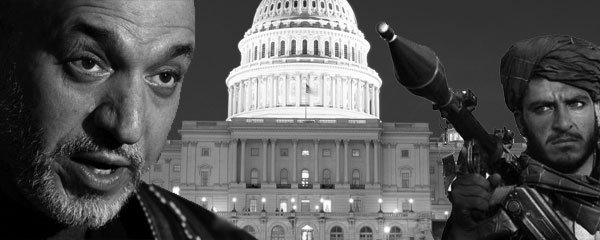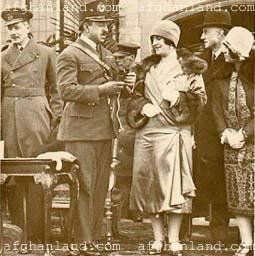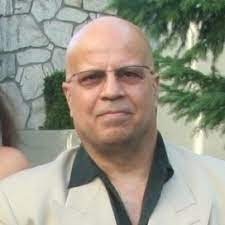
By Khalil Nouri STAFF WRITER / EDITOR
It is obvious that there is no military solution to the struggle in Afghanistan; therefore a political solution could be on the horizon. So far that too has proven to be a failing effort when the Taliban, who were supposedly partaking in the recent consultative Loya-Jirgah gathering in an effort to reconcile in Kabul, answered instead with a barrage of explosive attacks that consequently disrupted the council.
So, what else is on the table to justify the war in Afghanistan and keep the government of Hamid Karzai afloat?
Apparently the US military brass and Mr. Karzai did some brain storming recently, and they were in approval of introducing another plan by giving the tip off of vastly untapped mineral deposits in the Hindu- Kush mountains of the Central Asian state; which quickly jumped from $1 trillion value to $3 trillion in a matter of 36 hours. There are many legitimate questions as to whether the mineral deposits are authentic or a hoaxed, but the fact remains, many Afghans and many people in the West are not accepting this joint U.S.-Afghan government idea.
PAST MANIPULATIONS BY BRITISH AND RELIGIOUS SECTS
In Afghanistan myths are the same as fables, legends, folktales, fairy tales, anecdotes or fiction, but their sloppy usage in politics and religion has blurred the distinctions in many people’s minds. They are sometimes used in a bad way in reference to a belief of culture or for a belief in a religion by implying that the story is both believable and factual. Consequently, considering the past history of British colonial deceit and manipulation of Afghan society and interference in the internal affairs of Afghanistan, some Afghans do not believe anything conveyed by the West is genuine anymore.
Not long ago UK’s Defense Secretary Dr. Liam Fox, called Afghanistan, a “broken 13th-century country.” Of course, his view reverberated in the world as Afghanistan is a tribal and medieval society. In fact, Afghanistan by 13th-century was at the heart of the Islamic renaissance, boasting magnificent architecture, art, calligraphy, literature, advances in mathematics and production of poets akin to Jalaluddin Rumi who was born in 1207 in the northern city of Balkh.
That said, in most rural areas in Afghanistan, time is frozen in a centuries old antiquated system, technology advances are null, illiteracy is high and societal beliefs are of conservative Islam, therefore, in such a society, mythology is perceived as authentic, and dominates people’s thoughts and daily lives. Afghans are not simpleminded people; they have retained their complex oral traditions. However, their oral traditions do suggest the possibility of mythical beliefs that can be manipulated by a lack of understanding of foreign technology. This limited exposure to foreign technology allowed past colonial rulers like the Britain to manipulate Afghan customs and beliefs to temporarily gain a foothold over religious leaders, and thereby gain control over public will long enough to overthrowing past Afghanistan rulers.
The late progressive Afghan King Amanullah who gained Afghanistan’s independence in 1919, 28 years ahead of colonial India’s independence, miscalculated British ability to topple his government by turning traditionalists and mullahs against him. While visiting India, the young King appeared to be very enthusiastic about liberating Muslim countries from the rule of colonial power. He was greeted as a hero in India and the Indian freedom fighters asked him to give a fetwa announcing that he become the King of India too. King Amanullah, however, did not issue the fetwa, but his appearance in India forced the British to see that India would be next in line to become free of their colonial rule if Amanullah were to remain in power.

Therefore, the British conspired against Amanullah by using the mullahs and traditionalists limited knowledge of technology to their advantage; they produced false and shocking photographs of queen Soraya, wife of Amanullah, half naked with foreign men. Seeing these (photo-shopped) images, religious leaders believed Amanullah could not be a true Muslim and therefore did not deserve to be King. This little technology advantage yielded great political advantage to the British and consequently was a factor for the collapse of the king’s reign. But now, awakened to the technology, Afghans rightly blame the Britain for this plot, and regret losing such an iconic figure as their leader.
There are many tales of how new innovations leaked forward to produce such public manipulations in Afghanistan’s past; one short narrative example is when a mullah fools the public by converting water into milk and the audience kneels down in deference to the man of religion for his astounding power. Of course, this was in the early days after the invention of powdered milk in 1832.
The most obvious case is shown in a Hollywood picture plot about the true (1888) story of “The Man Who Would Be King” written by Rudyard Kipling and starring Sean Connery and Michael Caine. The story is about two British colonial soldiers who after crossing the border from India became kings of a remote area in Afghanistan called Kafiristan—now Nuristan—they were treated as Gods by the locals but ultimately lost everything when locals become aware of their deceit.
GEOLOGICAL AND ECONOMICAL CONCEPTUALIZATION OF MINERAL MINES IN AFGHANISTAN

However, another way of looking at all this is that finally after decades of war some good news about Afghanistan has finally raised to the surface; it could be an omen to all that beneath the landmines, Afghanistan is sitting on a goldmine.
This information sounds rather astonishing; it leads us to assume that Afghanistan has actually hit the jackpot in the world’s economy arena. However, the $1 trillion figure, where did it come from? It appears highly misleading. It is a theoretical number and may have little relation to the value of resources that could actually be exploited. Furthermore, it will be of little benefit to Afghanistan if its $1 trillion resources would cost $2 trillion or more to dig up. Thus, to justify the validity of this perception, –which apparently lacked proper homework—the figure was immediately increased to $3 trillion; apparently the first figure did not sound awesome enough.
This suspiciously round number appears to be based on geological surveys made decades ago as well as recent on the ground and in the air 3 dimensional ground scanning technology. How thorough it really has been is an open debate, given that it takes the world’s best miners about a decade to explore a new area.
Even if there were $3 trillion of mineral resources in Afghanistan, and even if those resources were economically feasible, it would be years before a large Western miner establishment could get anywhere near the country. They currently have no intention of moving into Afghanistan because the risk is far greater than the reward. The investment would be too risky anywhere the Afghan government does not control; plus all the territory and contract laws are far from solid.
The only people who might show interest in exploring the aforementioned mineral deposits are the Chinese, but they had to abandon a far simpler project than the untapped Afghan treasures; the Kajaki’s Helmand Province hydroelectric dam project was forsaken due to a lack of security in the area.
CONCLUSION
There are vague hypothesis attached to this recent joint perception of mineral wealth announced by the US and Afghan governments.
Is it time to change course and divert attention from the failed hearts and minds operation in Marjah, the failed reconciliation Jirga, failed opium eradication, the stalled Kandahar operation, Mr. Karzai’s tantrums, the Afghan government corruption, thriving drug trafficking, warlordism, Kandahar’s power brokers, fraudulent presidential elections, heightened insurgency, Pakistan’s uncooperative effort to contain the Taliban on its soil, regional powers proxy wars, so on and so forth?
Some in the West share the mining industry’s skepticism that massive amounts of mineral wealth could be easily extracted from Afghanistan’s rugged mountains and remote regions. This is believed to be in conjunction with the growing public sentiment that the war is not worth the cost.
Similarly, some Afghans, view that the era of past colonial manipulation of Afghan society, thought and sensibility is once again repeating itself. If so, then the public sentiment will be far damning than now.
In any event, time is of the essence for either success or failure in Afghanistan. Unfortunately, so far, the momentum has been on the path of failure.
If there is vast mineral wealth in Afghanistan, then the world needs to realize that this wealth belongs to the Afghan people. There are Afghans around the world with the skills and knowledge to do this job themselves on behalf of the people of Afghanistan.
A good friend of my family speaks about how decades of fighting has left the Afghan people with physical and mental health issues that no one is addressing. What is needed today is an Afghan to Afghan initiative that takes charge of the research and development of any potential mineral and mining deposits first and foremost for the benefit of those Afghans who have suffered from abuse and neglect on their own home soil over the decades.
We expatriate Afghans need to look out for our brothers and sisters in Afghanistan who are not aware of 21st Century methodologies, ideologies and technologies that can rob them of their inheritance. It is our job to protect and enlighten fellow Afghans who are at risk.
Khalil Nouri is the cofounder of New World Strategies Coalition Inc., a native think tank for nonmilitary solution studies for Afghanistan. www.nwscinc.org

Khalil Nouri was born in an Afghan political family. His father, uncles, and cousins were all career diplomats in the Afghan government. His father was also amongst the very first in 1944 to open and work in the Afghan Embassy in Washington D.C., and subsequently his diplomatic career was in Moscow, Pakistan, London and Indonesia. Throughout all this time, since 1960’s, Khalil grew to be exposed in Afghan politics and foreign policy. During the past 35 years he has been closely following the dreadful situation in Afghanistan. His years of self- contemplation of complex Afghan political strife and also his recognized tribal roots gave him the upper edge to understand the exact symptoms of the grim situation in Afghanistan. In that regards, he sees himself being part of the solution for a stable and a prosperous Afghanistan, similar to the one he once knew. One of his major duties at the beginning of Operation Enduring Freedom in Afghanistan in 2002 was advisory role to LTG Franklin Hegenbeck. He has worked closely with the Afghan tribes and his tribal exposure is well tailored for unobstructed cross-cultural boundaries within all Afghan ethnicities. He takes pride in his family lineage specifically with the last name “Nouri” surnamed from his great-grandfather “Nour Mohammad Khan” uncle to King Nader-Shah and governor of Kandahar in 1830, who signed the British defeat and exit conformity leaving the last Afghan territory in second Anglo-Afghan war. Khalil is a guest columnist for Seattle Times, McClatchy News Tribune, Laguna Journal, Canada Free Press, Salem News, Opinion Maker and a staff writer for Veterans Today. He is the cofounder of NWSC Inc. (New World Strategies Coalition Inc.) a center for Integrative-Studies and a center for Integrative-Action that consists of 24- nonmilitary solution for Afghanistan. The function of the Integrative-Studies division (a native Afghan think tank) is to create ideas and then evolve them into concepts that can be turned over to the Integrative-Action division for implementation. Khalil has been a Boeing Engineer in Commercial Airplane Group since 1990, he moved to the United States in 1974. He has a Bachelor of Science degree in Mechanical Engineering, and currently enrolled in Masters of Science program in Diplomacy / Foreign Policy.
ATTENTION READERS
We See The World From All Sides and Want YOU To Be Fully InformedIn fact, intentional disinformation is a disgraceful scourge in media today. So to assuage any possible errant incorrect information posted herein, we strongly encourage you to seek corroboration from other non-VT sources before forming an educated opinion.
About VT - Policies & Disclosures - Comment Policy



